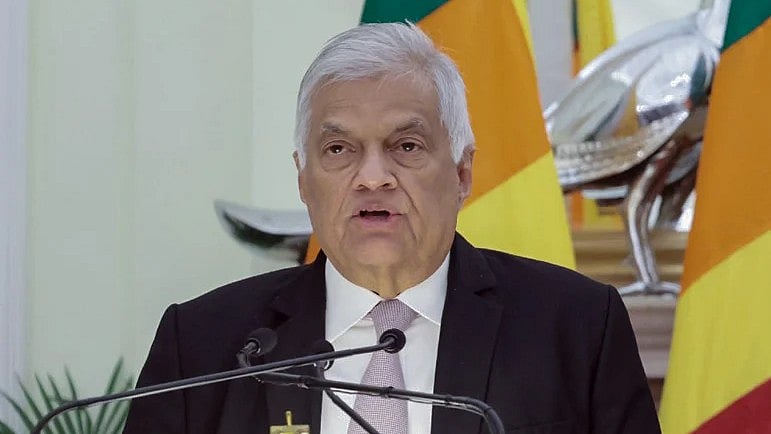Former Sri Lankan President Ranil Wickremesinghe's Arrest Raises Fears Of Political Vendetta
The arrest of former Sri Lankan President Ranil Wickremesinghe on a charge of misuse of public funds for a private visit to Britain two years ago has rocked the island nation, which only recently started emerging from economic turmoil.

Sri Lanka's former president Ranil Wickremesinghe | ANI
The arrest of former Sri Lankan President Ranil Wickremesinghe on a charge of misuse of public funds for a private visit to Britain two years ago has rocked the island nation, which only recently started emerging from economic turmoil.
A lawyer-politician who served as Prime Minister six times and became President in the wake of a public revolt that ousted incumbent Gotabaya Rajapaksa in 2022, he had the difficult task of steering the country’s enfeebled economy. Wickremesinghe, who imposed harsh austerity measures and secured a bailout from the International Monetary Fund (IMF), however, found his political fortunes sliding after his defeat last year in presidential polls that were won by Anura Kumara Dissanayake, a leftist politician from the Janatha Vimukthi Peramuna (JVP) and leader of the ruling National People’s Power (NPP) alliance.
The ascendance of the JVP-led government has apparently brought the ghosts of the past back to haunt Sri Lanka’s politics, notably the impact of the bailouts of the island’s debt-ridden economy and the past campaigns to crush violent JVP activities. Wickremesinghe’s United National Party (UNP) was at the forefront of the anti-JVP actions, leading to the torture and death of many, and he himself was held responsible by Peramuna cadres for choosing one of the notorious detention sites.
Yet, an inquiry commission found no evidence to link him to the horrors at the Batalanda site. Amidst such historical differences, the charge of misuse of public funds begs the question whether a trivial expense of $55,000 to visit Britain for a university event, at which his wife was felicitated on her honorary professorship, warrants unprecedented arrest and remand in jail.
Wickremesinghe’s arrest has obvious implications for former presidents who are ideologically distant from the ruling NPP alliance, given that Dissanayake has promised to enquire into many past crises, including the ghastly Colombo Easter Sunday bombings of 2019 that killed 290 people and the alleged obstruction of the official inquiry into the carnage by Gotabaya’s government.
Significantly, three former presidents and rivals, Chandrika Kumaratunga, Mahinda Rajapaksa and Maithripala Sirisena, have come out in support of the detained leader and framed the arrest as an assault on democracy. For the Sri Lankan government, this is a crisis it does not need at a time when its nascent economic recovery since 2023 and good growth rates have yet to translate into normalised living standards for its population.
The World Bank said recently that the country struggled with low household incomes, high personal borrowings, malnutrition and reduced spending on human capital, much of it due to raised costs, although tourism revenues were up. While anti-corruption initiatives will undoubtedly have wide public support, in parallel with higher administrative efficiency, this must be achieved through structural change. The government’s approach in the Wickremesinghe episode does little for basic reform.
Published on: Tuesday, August 26, 2025, 03:17 PM ISTRECENT STORIES
-
-
-
-
-